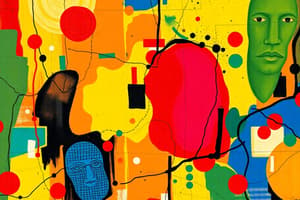Podcast
Questions and Answers
What does Epistemology primarily focus on?
What does Epistemology primarily focus on?
- The morality of actions
- The nature of reality
- The nature of beauty
- How to attain knowledge (correct)
Which philosopher is credited as the founder of Western philosophy?
Which philosopher is credited as the founder of Western philosophy?
- Rene Descartes
- Plato
- Socrates (correct)
- Aristotle
Which branch of philosophy would most likely address questions about justice and morality?
Which branch of philosophy would most likely address questions about justice and morality?
- Metaphysics
- Epistemology
- Ethics (correct)
- Political Philosophy
What significant concept did Plato introduce in his philosophy?
What significant concept did Plato introduce in his philosophy?
What did Aristotle believe regarding the attainment of knowledge?
What did Aristotle believe regarding the attainment of knowledge?
What does Rationalism primarily emphasize regarding knowledge?
What does Rationalism primarily emphasize regarding knowledge?
Who is known as the 'father of political science'?
Who is known as the 'father of political science'?
What is a key characteristic of Postmodernism in relation to truth?
What is a key characteristic of Postmodernism in relation to truth?
According to Existentialism, what precedes existence?
According to Existentialism, what precedes existence?
What philosophical view did John Locke advocate regarding knowledge?
What philosophical view did John Locke advocate regarding knowledge?
Flashcards are hidden until you start studying
Study Notes
Introduction to Philosophy
- Philosophy combines "Philo" (love) and "Sophia" (wisdom), focusing on life's big questions.
- It enhances understanding of various aspects of existence, beginning from a sense of wonder and pursuit of truth.
Branches of Philosophy
- Metaphysics: Investigates the nature and origin of reality; asks questions like "What is real?"
- Epistemology: Studies knowledge acquisition; includes:
- Rationalism: Knowledge gained through rational thought; notable figure: René Descartes with "I think, therefore I am."
- Empiricism: Knowledge derived from sensory experience; John Locke stated, "Mind is like tabula rasa" (blank slate).
- Ethics: Examines morality and definitions of justice, goodness, and badness.
- Logic: Focuses on rational thinking, identifies common logical fallacies.
- Political Philosophy: Analyzes government systems and laws.
- Aesthetics: Explores the nature of beauty.
Key Philosophers in Western Philosophy
- Pre-Socratic Era (400-600 BCE):
- Thales: Proposed everything is made of water.
- Democritus: Early idea of atoms.
- Pythagoras: Believed mathematics could solve all problems.
- Heraclitus: Noted that change is constant.
- Socrates: Founder of Western philosophy, emphasized introspection with "The unexamined life is not worth living."
- Plato: Student of Socrates. Developed the Theory of Forms, distinguishing between the world of ideas and the material world; influential in establishing philosophical schools and thoughts.
- Aristotle: Critiqued Plato; knowledge stems from sensory experiences and moderation through virtue.
Medieval Philosophy
- Centered on the existence of God, lacking scientific advancements.
- Thomas Aquinas: Offered five arguments for God's existence, addressing:
- Motion
- Causation
- Contingency
- Goodness/Perfection
- Design
- Differentiates between Natural Law (moral truths) and Human Law (dogmatic beliefs).
Modern Philosophy
- Renaissance and Age of Reason: Emphasized human significance and rational thought.
- Rationalism:
- René Descartes encouraged skepticism and logical analysis of doubt.
- Empiricism:
- John Locke defined knowledge as stemming from experience.
- Niccolò Machiavelli: Recognized as the father of political science; suggested it is better to be feared than loved in governance.
Existentialism and Post-Modernism
- Existentialism: Focuses on the individual’s existence; Aldous Camus highlighted the absurdity of life.
- Post-Modernism: Challenges the existence of absolute truths; emphasizes uncertainty and limitations of knowledge.
Studying That Suits You
Use AI to generate personalized quizzes and flashcards to suit your learning preferences.




